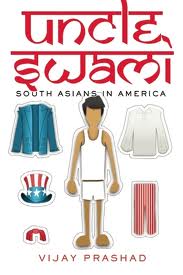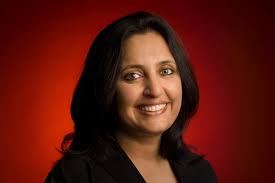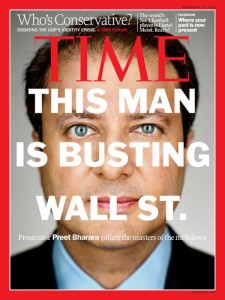Vijay Prashad’s new book, Uncle Swami: South Asians in America Today, is probably best seen as a continuation  of the ideas he developed in his highly influential first book The Karma of Brown Folk. Karma was the very first book to look seriously at the culture and politics of the South Asian American diaspora as it was beginning to shape up in the 1990s.
of the ideas he developed in his highly influential first book The Karma of Brown Folk. Karma was the very first book to look seriously at the culture and politics of the South Asian American diaspora as it was beginning to shape up in the 1990s.
Karma had the benefit of a thought-provoking, self-conscious, and very memorable title — invoking W.E.B. DuBois’ groundbreaking meditation on race and identity, The Souls of Black Folk, but applying the requisite Desi “remix” effect with the insertion of “karma” for “souls.” I found Karma provocative for its attempt to insert the term “Desi” as an identity marker for South Asian Americans (we debated the rightness of “Desi” quite a bit on the desi group blog Sepia Mutiny between 2004 and 2010), as well as for its provocations on Indian outsourcing (which was creating, Prashad argued, a class of “high tech coolies”) and the naïve embrace of Hindu nationalist ideology at a distance (“Yankee Hindutva”).
That said, while that earlier book has helped to shape the conversation around the South Asian diaspora amongst progressive thinkers, writers, and activists for more than a decade, as a history it was a bit thin. With its strongly polemical tone and framing, Karma has not proved effective when I’ve assigned sections of it to undergraduate students; more recent works like Vinay Lal’s The Other Indians give students with no prior knowledge about either the Indian subcontinent or the Indian diaspora a much better basic background.
In the new book, Prashad continues to play with cultural tropes (“Uncle Swami” is a twist on “Uncle Sam”). He does valuable work in reviewing many controversies and identity-oriented issues that we have been talking about over the past decade; there are timely updates on his earlier discussions of Indian American “model minority” status (now with an asterisk connected to the War on Terror) as well as “Yankee Hindutva.” As such, regular readers of Prashad’s books and columns will likely want to pick this one up as well. But Uncle Swami remains short on what we might think of as the broader picture: the image of the evolving South Asian American community as a whole.
Of course, as an immigrant group that has only become visible to American society more broadly in the past 30 or so years, the South Asian community has been constantly evolving as representations of it have shifted. The past 15 years alone have seen a number of major, transformative events — from the crisis of 9/11, to the rise of Indra Nooyi, Bobby Jindal, Nikki Haley — and now Satya Nadella — to the appearance of a sizeable number of highly visible Desi entertainers and celebrities, including Jay Sean, M.I.A., Kal Penn, Padma Lakshmi, Aziz Ansari, Nina Davuluri, Russell Peters, Hari Kondabolu, and Mindy Kaling. Prashad is all over the political and business heavyweights — most of them come off badly — but he doesn’t have much to say about the softer “cultural” figures named above. (Someone should really write a book about the meteoric rise of a South Asian American comedy culture.)
There are compelling sections of Uncle Swami dealing with the anxiety caused by 9/11 on the self-image of South Asian Americans as an emerging “model minority,” as well as a detailed and largely persuasive critique of Bobby Jindal’s strange (and deeply ironic) flirtation with southern anti-black racism in his landmark rise as the first non-white governor of Louisiana since the (anomalous) Reconstruction period after the Civil War. There are also sections dealing with topics like the arrest of Raj Rajaratnam and Rajat Gupta, the controversy over Barack Obama’s appointment of Sonal Shah to a position in his first administration, and a long chapter on the rise of a new Indian lobbying group called USINPAC (“How the Hindus Became Jews”).
I agree with Prashad on many of his assessments, especially his sense that the intense efforts by the FBI to seek out Islamic militants between about 2001 and about 2008 frequently led to gross abuses (i.e., the “Lackawanna Six” and the deportation of Tashnuba Hayder). Incidentally, Amitava Kumar has also written quite astutely about the absurdity and excess of the domestic American prosecution of the “War on Terror” in his 2010 book A Foreigner Carrying in the Crook of His Arm a Tiny Bomb (that book, in my view, did not get as much attention as it deserved).

That said, I cannot agree with Prashad on everything. In December 2008, I was part of a rather polarized internet “kerfuffle” (Prashad’s word) over Sonal Shah, a person who had come to prominence as a Democratic Party figure with considerable organizational skills. Prashad started the ball rolling with a caustic column in Counterpunch suggesting that Shah’s connections to American chapters of Hindu nationalist organizations ought to raise some alarm bells. Writing in Sepia Mutiny, I argued that Prashad’s column was unfair; it looked as if Shah’s main affiliations with these groups ended as of 2001, and there was no direct evidence that she held any bias against Muslims or other Indian religious minorities. The service group Indicorps, which she ran with her brother and which aimed to be an Indian diaspora version of Americorps, appeared to operate as a useful (and secular) group.
I will not re-argue that topic again here, but one wonders: why should we still care about “Obama’s Indian,” especially since the Obama administration’s subsequent policy towards India has remained fairly consistent and rigorous (one thinks of the question of Narendra Modi’s visa that came to light after he had been invited to speak at the University of Pennsylvania in 2013)? And what, if anything, have we learned from these and other controversies in recent years about “South Asians in America today”?
For me, incidents like this one remind us that traditional ideological positions (left/right; secular/non-secular) and the emerging idea of South Asian American “cultural identity” do not always align perfectly clearly, so perhaps we should be cautious before rushing to separate the “good guys” from the “bad guys.” At one point, Prashad comes close to acknowledging the limitations of generalizing too much on the basis of Raj Rajaratnam or the corrupt Indian American businessmen associated with disgraced Illinois governor Rod Blagojevich. For every corrupt Rajat Gupta there is a crusading Preet Bharara: “All these Punjabis, on all sides of the fence.”

But Prashad leaves it at that, and such an acknowledgment of the differences within the South Asian American professional world is an exception rather than the rule in Uncle Swami. The Good Guys are regularly name-checked by Prashad — first and foremost the progressive Desi activists (SAALT, DRUM, NYTWA, and now the 100 Imams of the Muslim Peace Coalition). The Bad Guys are Indian-American Republicans, overly pragmatic Indian-American Democrats, long-distance Hindu nationalists (though not so much radicalized Sikhs or Muslims), Hindus who wannabe Jews, and upper-middle class Desis who follow the medical/legal/corporate track (rather than the private liberal arts college, identity politics track). Working class Desis and recent immigrants who take on service jobs in retail and driving taxis certainly do get Prashad’s sympathy, but they do not get much actual attention in Uncle Swami (nor for that matter do they appear much in The Karma of Brown Folk).
I always enjoy reading Vijay Prashad, even when I find his limitations frustrating. But we should be clear that books like Uncle Swami and The Karma of Brown Folk are really collections of short polemical essays that are at their best when they call overly-privileged fellow “Brown Folk” to task. They would be less effective if we were to think of them as comprehensive accounts of the recent history of the broader South Asian American community.
Amardeep Singh teaches literature at Lehigh University. You can find him on Twitter or on his personal blog.












